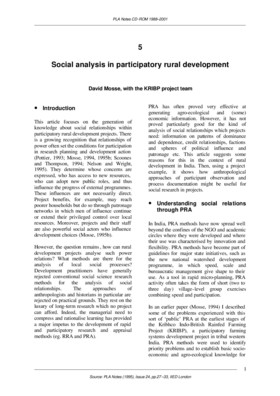PLA Notes CD-ROM 1988-2001 5 Social analysis in participatory rural development

Document begins: PLA Notes CD-ROM 19882001 5 Social analysis in participatory rural development David Mosse, with the KRIBP project team Introduction PRA has often proved very effective at generating agro-ecological and (some) economic information. However, it has not This article focuses on the generation of proved particularly good for the kind of knowledge about social relationships within analysis of social relationships which projects participatory rural development projects. There need: information on patterns of dominance is a growing recognition that relationships of and dependence, credit relationships, factions power often set the conditions for participation and spheres of political influence and in research planning and development action patronage etc. This article suggests some (Pottier, 1993; Mosse, 1994, 1995b; Scoones reasons for this in the context of rural and Thompson, 1994; Nelson and Wright, development in India. Then, using a project 1995). They determine whose concerns are example, it shows how anthropological expressed, who has access to new resources, approaches of participant observation and who can adopt new public roles, and thus process documentation might be useful for influence the progress of external programmes. social research in projects. These influences are not necessarily direct. Project benefits, for example, may reach poorer households but ...
Cite this publication
Available at https://www.iied.org/g01594